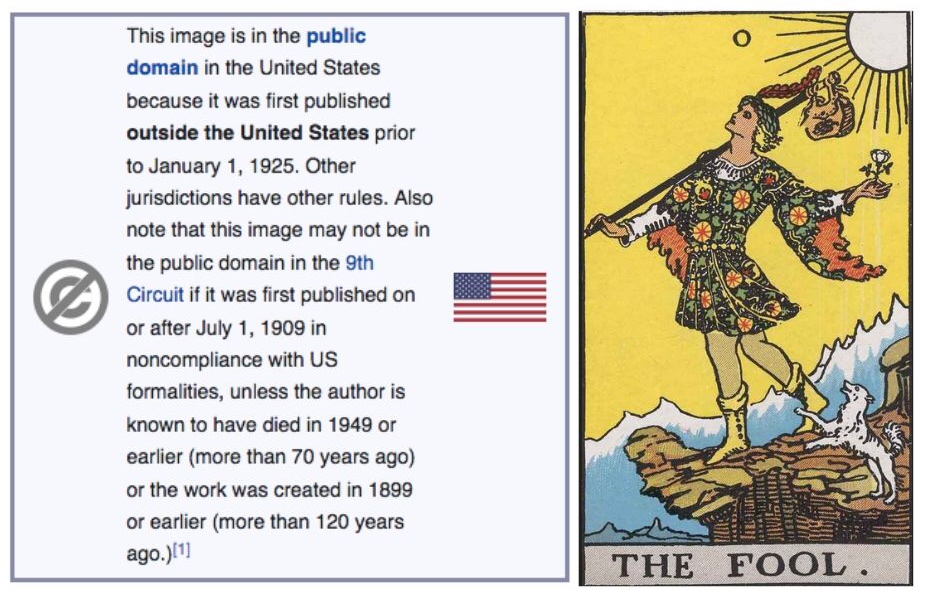As a photographer who licenses her photos professionally, I’m particularly sensitive to intellectual property laws around copyright. When I launched this site and wanted to use photos of my cards and spreads for posts, I started looking into what kind of permissions I might need to display a copyrighted tarot card design.
In short, any published tarot card is protected intellectual property, and using that card in any manner, except personal readings for yourself and friends and family, may infringe on the creator’s rights. In order to use tarot card images online or in any published material, you need to secure permission or face a potential lawsuit for copyright violation or be at risk of having your site or social media account shut down. Some tarot card creators may be happy to have you share their designs, some may require attribution, and some may require licensing fees for certain types of use. The onus is on you to find out what the conditions for use are before you use images of the cards online.
Copyright holders vary in how stringent and aggressive they are about enforcing their rights. Posting your card-a-day pulls on Instagram is unlikely to attract undue attention (though is still technically an infringement and violates the terms of service for Instagram that you agreed to but probably didn’t read when you signed up for the service) while publishing and selling an e-book with images of cards and spreads is a serious violation. In between are websites and blog posts, YouTube readings, tarot courses, and even online readings for profit.
What does this mean? If you want to use someone’s intellectual property on your website or for reasons other than entirely personal use, you need to secure permission at minimum, and potentially pay a licensing fee. Look for the copyright symbol © on the cards, the box, or in the little white book that came with your deck, and reach out to the copyright holder. Some of the larger publishing houses like US Games Systems and Llewellyn provide explicit guidelines on what you can do without explicit permission or licensing fees, and in some cases supply a form to fill out. Llewellyn and US Games Systems both state, for example, that you can use digital images of their cards in an email tarot reading for profit without explicit permission, but to use the card images in a tarot course you deliver for profit will incur licensing fees.
The Rider-Waite-Smith deck is an interesting study in the complexity of copyright law. It was first published in the UK in 1909, before the establishment of copyright law. There seems to be some debate as to whether the original card designs as commissioned by A.E. Waite and published in his book, The Pictorial Key to the Tarot, move into the public domain 70 years after his death, or 70 years after the death of the artist, Pamela Colman Smith. US Games Systems published their version of the commonly known and used Rider-Waite-Smith deck in 1971 and hold the rights to that design, which is a very slight variant on the original. This article provides some interesting context to the debate about the copyright status of the RWS deck. General opinion seems to hold that the images as originally published are now in public domain in the US, and that they will pass into public domain in the UK in 2021.
Copyright, like most legal issues, is a complicated field and I am not a lawyer. Finding yourself on the wrong side of a copyright infringement suit can be an expensive and unpleasant endeavour, and it’s definitely worth the time and effort to learn the basics and protect yourself. It’s also the right thing to do to respect the intellectual property of creators by giving them attribution at all times, and paying licensing fees when necessary.


Hello,
I find your article very helpful. I would like to ask whether you know where to look up public domain status in a country different from UK or US. Or does it mean it’s pubpic domain everywhere but UK? Thank you.
Each jurisdiction will have their own laws around public domain, so I believe you’d have to look it up for your country.
Hello!
Will this also apply to a deck that uses Disney’s characters but everything was handrawn by the seller?
Like using Disney characters but for creative purposes, and then selling them. I don’t plan on selling them though, I just want to use the deck when I do readings.
In general, you’re probably okay for doing using the characters for personal use. If you started doing YouTube readings with that deck, I think you’d start getting into a grey area. Any time you profit from someone else’s IP, you’re into the danger zone. It would be like if you painted Disney characters on your child’s bedroom wall – that would be fine. But if you painted them on the wall of your daycare, that might be questionable. (Disclaimer: I’m not an IP lawyer, I’ve just had a lot of experience with licensing through my photography business.)